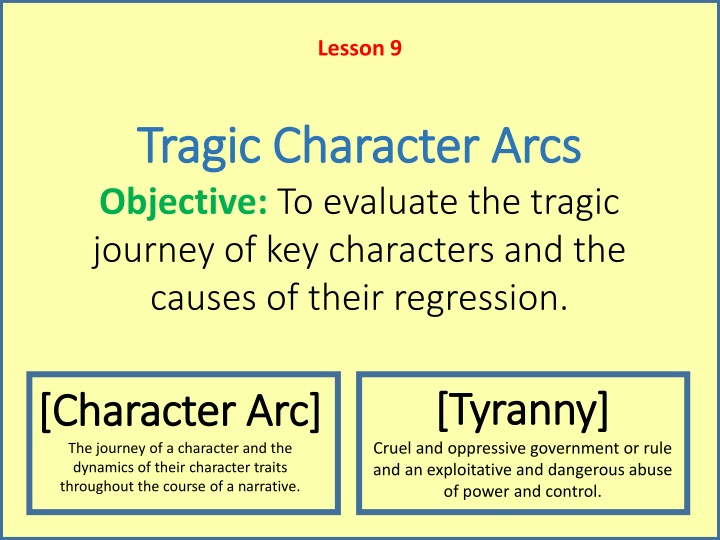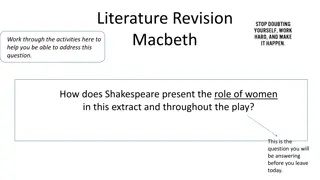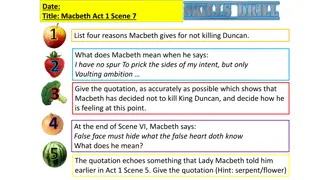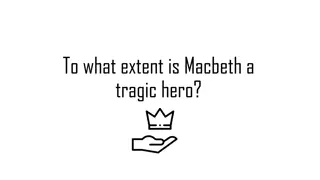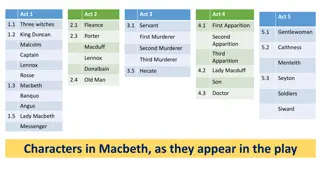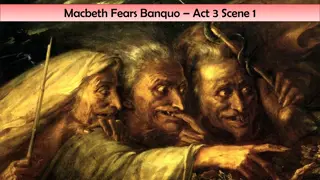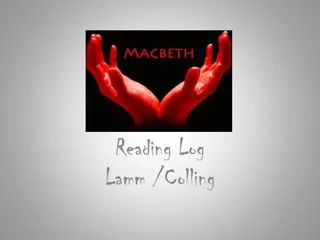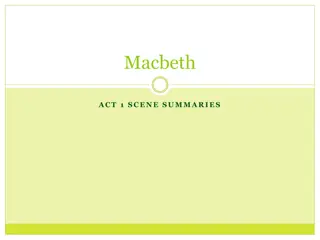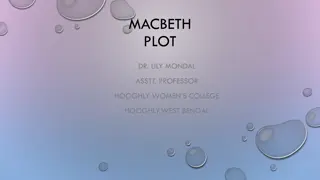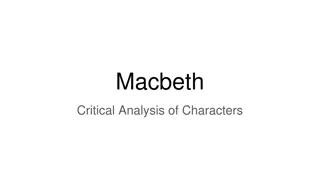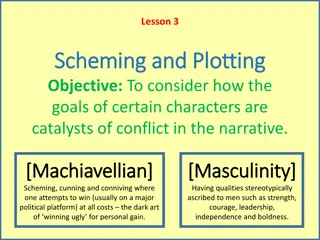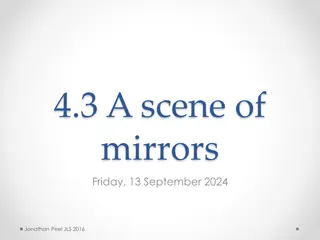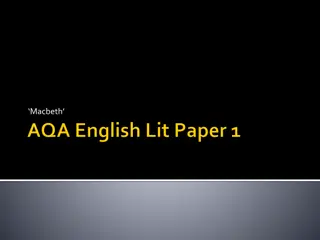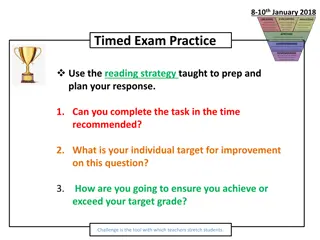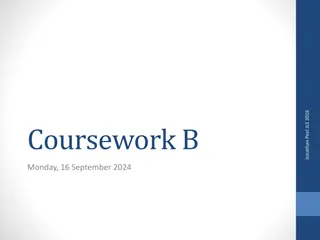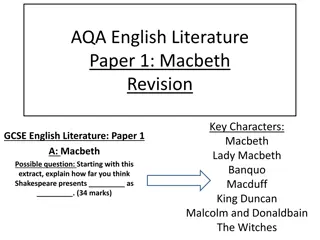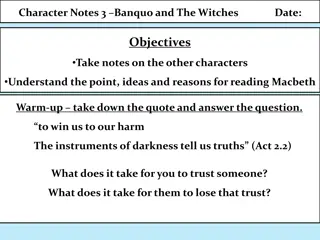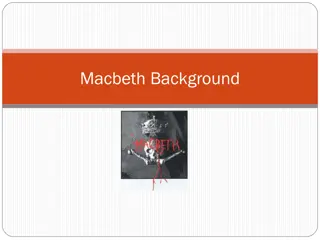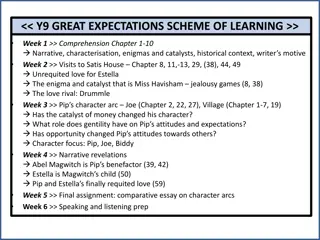Exploring Tragic Character Arcs in Macbeth: A Study of Tyranny and Regression
Delve into the tragic character arcs of key figures in Macbeth, examining the themes of tyranny, regression, and the impact of power dynamics on character development. Explore the profound and haunting journey of Lady Macbeth, analyzing her descent into darkness and ultimate tragedy. Investigate Shakespeare's portrayal of the supernatural and fate in the play, alongside the pivotal moments that shape Macbeth's regressive arc. Uncover the complexities of the characters' struggles against a backdrop of cruelty and oppression in a world consumed by ambition and deception.
Download Presentation

Please find below an Image/Link to download the presentation.
The content on the website is provided AS IS for your information and personal use only. It may not be sold, licensed, or shared on other websites without obtaining consent from the author.If you encounter any issues during the download, it is possible that the publisher has removed the file from their server.
You are allowed to download the files provided on this website for personal or commercial use, subject to the condition that they are used lawfully. All files are the property of their respective owners.
The content on the website is provided AS IS for your information and personal use only. It may not be sold, licensed, or shared on other websites without obtaining consent from the author.
E N D
Presentation Transcript
Lesson 9 Tragic Character Arcs Tragic Character Arcs Objective: To evaluate the tragic journey of key characters and the causes of their regression. [Tyranny] [Tyranny] Cruel and oppressive government or rule and an exploitative and dangerous abuse of power and control. [Character Arc] [Character Arc] The journey of a character and the dynamics of their character traits throughout the course of a narrative.
TEACHERS GUIDE Lesson Structure 9 Character arcs Objective To explore the tragic journey of key characters. Starter Timed writing task response - can we sympathise with Macbeth and Lady Macbeth at all? Reading Act 5 Scene 1 Lady Macbeth s Suicide Scene Analysis PPTs Act 4 Scene 2-3 Act 5 Scene 1 Film Clip (on estream Macbeth Fassbender version) 1:16:00 Malcolm tells Macduff of his family s execution 1:18:30-1:23:00 Lady Macbeth s depression Main (optional could be set as Homework tasks). PEEL Paragraph Why is Lady Macbeth s character arc so profound and tragic in this play? Plenary Play the judge what is the best and worst type of leader? Key terms Tyranny, Suicide, Tragedy, Mental health
TIMED WRITING TASK RESPONSE [5 MINUTES] Can we sympathise with Macbeth and Can we sympathise with Macbeth and Lady Macbeth at all? Why or why not? Lady Macbeth at all? Why or why not?
CLASS READING Act 5 Scene 1 Act 5 Scene 1 Lady Macbeth s Suicide Lady Macbeth s Suicide
PEEL TASK How does Shakespeare present the supernatural How does Shakespeare present the supernatural and the notion of fate in Macbeth ? and the notion of fate in Macbeth ?
Act 4 Scene 2 Analysis Act 4 Scene 2 Analysis Suspense - The audience are waiting throughout this scene for something bad to happen to Macduff s family. Deception Lady Macduff tells her son that her father is a traitor in-depth conversation between mother and son about the nature of treason and who can be declared treasonous. Off-stage - Though we see the boy being murdered, Macbeth doesn t carry out the deed suggestion that Macbeth could not have brought himself to do it even if he wanted to. Macbeth s low-point out-and-out villain: - the only way to keep him remotely redeemable is that he is not the direct murderer of the young boy. Regressive character arc - A tragic play requires that we have some sympathy towards Macbeth even if it is such a tiny amount. - Structural ploys to make some elements of sympathy for the central character.
Act 4 Scene 3 Analysis Act 4 Scene 3 Analysis Theme - deception, appearances vs. reality. One of the longest scenes in the whole play - - establishes the character who is big and strong enough to tackle Macbeth. Macduff and Malcolm s long conversation serves a number of purposes: - Malcolm (in contrast to his father) is showing immense caution and is testing Macduff to see if he can trust him. - to show an unfelt sorrow is an office which the false man does easy - LM had previously chided Macbeth on showing his face like a book Macbeth becomes more duplicitous after this. - suggestion that Macbeth has sent spies to try to trick Malcolm (if he comes back to Scotland, he will be killed by Macbeth). - this scene is critical of Scotland (and also what a good king should be like). - Malcolm denounces himself as greedy, violent and lustful effort to gauge Macduff s reaction. - If he were to be king, he would pour the sweet milk of Concord into hell, up all the universe of peace, confound all unity on earth . - Macduff is at his wit s end this is a subtle way of describing Scotland s state under Macbeth s rule men s actions can disrupt the natural order (which can result in disruptions in nature). - Malcolm is describing a country completed ruined and miserable this is precisely what Macbeth s Scotland really is. Analysis of Kings - Malcolm goes on to say that he s none of the things that evil Kings he has described, are. - he then describes what a good King is like and references Edward the Confessor. - people perceived that Kings had miraculous healing abilities they were supernaturally deified. - Edward the Confessor (King James related) Shakespeare is trying to present the King in a good light Edward is gentle and noble, Macbeth is murderous and barbaric (contrasts). The cycle of murder continues - Macduff learns that his family have been murdered Macduff and Malcom now seem like convincing, well-exposited characters with the task of dethroning the tyrant Macbeth.
Act 5 Scene 1 Analysis Act 5 Scene 1 Analysis Lady Macbeth has lost her mind: - in previous Acts, she seems completely untroubled by evil and the supernatural in Act 3: the dead are but as pictures she is now walking and talking in her sleep (sign of madness). - in this scene, she seems lost she s gone beyond humanity, and the guilt and stress on her mind is too much to bare. - earlier, convinces Macbeth to kill Duncan by attacking his manhood but now, Macbeth says - I dare do all that may become a man, who dares do more is none anyone who kills a King is not a man (because they ve lost their humanity). - Analogy by D.J. Enright Lady Macbeth is a sprinter in evil whilst Macbeth is a long-distance runner he starts off slowly but can go for much longer. - Reinforced through Shakespeare s repetition and imagery - Lady Macbeth s soliloquy repeatedly focuses on blood and murder - who would have thought that the old man would have had so much blood in him - earlier, she believes that washes your hands of the blood removes the deed from your mind however, she is learning the hard way of the toll these deeds have on her. Multiple meanings of quotation - Alternative interpretation for Shakespeare s use of language out, out, damned spot . - Interpretation #1 unable to literally wash the blood from her hands or figuratively clean the guilt from her mind. - Interpretation #2 she may be possessed by demons demons and witches were often known to have certain spots on their bodies which marked them out as evil out, out is a symbol that she is trying to get her soul back however, she has a price to pay for the crime she has committed. Suicide - Lady Macbeth s fate is the final nail in the coffin for her relationship with Macbeth after she dies (committing suicide), he is alone there is also a suggestion that he s already alone and her death means nothing to him.
Macbeth Lady Macbeth King Duncan Banquo Macduff Macbeth is a Scottish general and the Thane of Glamis who is greeted by prophecies from three witches that he will be made Thane of Cawdor. This comes true. He longs to become King and is then tempted into murder (partly by Lady Macbeth) to fulfill his ambitions to the throne. Once he commits his first crime (killing King Duncan), he is crowned King of Scotland. He is brave but not virtuous. Macbeth is courageous on the battlefield but ill-suited to politics, quickly becoming a tyrant. He becomes suspicious of even his close friends like Banquo. His response to every problem is violence and murder. Macbeth is never comfortable in his role as a criminal and this leads to a psychological regression. Macbeth s wife, a deeply ambitious woman who lusts for power and position. Early in the play she seems to be the stronger and more ruthless of the two, as she urges her husband to kill Duncan and seize the crown. After the bloodshed begins, Lady Macbeth falls victim to guilt and madness to an even greater degree than her husband. Her conscience affects her to such an extent that she eventually commits suicide. Interestingly, she and Macbeth are presented as being deeply in love, and many of Lady Macbeth s speeches imply that her influence over her husband is primarily sexual. Their joint alienation from the world, occasioned by their partnership in crime, seems to strengthen the attachment that they feel to each another. A Scottish nobleman hostile to Macbeth s kingship from the start. He eventually becomes a leader of the crusade to unseat Macbeth. The crusade s mission is to place the rightful king, Malcolm, on the throne, but Macduff also desires vengeance for Macbeth s murder of Macduff s wife and young son. The good King of Scotland whom Macbeth, in his ambition for the crown, murders. Duncan is the model of a virtuous, benevolent, and farsighted ruler. His death symbolizes the destruction of an order in Scotland that can be restored only when Duncan s line, in the person of Malcolm, once more occupies the throne. The brave, noble general whose children, according to the witches prophecy, will inherit the Scottish throne. Like Macbeth, Banquo thinks ambitious thoughts, but he does not translate those thoughts into action. In a sense, Banquo s character stands as a rebuke to Macbeth, since he represents the path Macbeth chose not to take: a path in which ambition need not lead to betrayal and murder. Appropriately, then, it is Banquo s ghost and not Duncan s that haunts Macbeth. In addition to embodying Macbeth s guilt for killing Banquo, the ghost also reminds Macbeth that he did not emulate Banquo s reaction to the witches prophecy. KEY CHARACTERS IN MACBETH Malcolm - The son of Duncan, whose restoration to the throne signals Scotland s return to order following Macbeth s reign of terror. Malcolm becomes a serious challenge to Macbeth with Macduff s aid (and the support of England). Prior to this, he appears weak and uncertain of his own power, as when he and Donalbain flee Scotland after their father s murder. Hecate - The goddess of witchcraft who works to enact her mischief on Macbeth (one of the three witches). Fleance - Banquo s son, who survives Macbeth s attempt to murder him. At the end of the play, Fleance s whereabouts are unknown. Presumably, he may come to rule Scotland, fulfilling the witches prophecy that Banquo s sons will sit on the Scottish throne. Macdonwald Traitor to the King whose army is defeated in battle by Macbeth and executed by King Duncan. Lennox - A Scottish nobleman. Ross - A Scottish nobleman. The Murderers - A group conscripted by Macbeth to murder Banquo, Fleance, Macduff s family (fails). Porter - The drunken doorman of Macbeth s castle. The Three Witches Three black and midnight hags who plot mischief against Macbeth using charms, spells, and prophecies. Their predictions prompt him to murder Duncan, to order the deaths of Banquo and his son, and to blindly believe in his own immortality. The play leaves the witches true identity unclear aside from the fact that they are servants of Hecate, we know little about their place in the cosmos. In some ways they resemble the mythological Fates, who impersonally weave the threads of human destiny. They clearly take a perverse delight in using their knowledge of the future to toy with and destroy human beings.
The Jacobean Era Elizabeth I and James I Historical Context Historical Context When Queen Elizabeth died in 1603, she had no children, or even nephews or nieces. The throne was offered to James Stuart, James VI of Scotland, who then became James I of Britain. Brought up by Protestant regents, James maintained a Protestant regime in Scotland when he came of age, and so was an acceptable choice for England which had become firmly Protestant under Elizabeth. James was a distant cousin of Elizabeth his ascension as King caused controversy amongst Catholic relatives (leading to Gunpowder Plot). Shakespeare was writing for the theatre during the reigns of two monarchs, Queen Elizabeth I and King James I. The plays he wrote during the reign of Queen Elizabeth, such as A Midsummer Night's Dream , are often seen to embody the optimistic mood of the Elizabethans. However, those he wrote during James's reign, such as Macbeth and Hamlet , are darker and more cynical, reflecting the insecurities of the Jacobean period. 1040 Macbeth is set in Medieval Scotland 1606 Macbeth is written in the Jacobean Era The Gunpowder Plot Shakespeare and James I The Divine Right of Kings Certain Catholics (Robert Catesby, Thomas Percy, Guy Fawkes and a few others) turned to terrorism during James I s Protestant rule, trying to blow up the Houses of Parliament in 1605. Macbeth was written the year after the Gunpowder Plot of 1605 and is considered a piece of propaganda in support of King James the message of the play: perpetrators of regicide will eventually receive their comeuppance. The conspirators were betrayed, and horribly tortured on the rack until they confessed. They were then executed in the most brutal fashion as a warning to other would-be traitors. Shakespeare s Macbeth wove direct references to the Plot including King James snake/flower medal. Whilst the present Queen claims constitutional impartiality, in the European Middle Ages, the Divine Right of Kings was a dominant concept. The idea claimed that kings were answerable only to God and it was therefore treachery to challenge them. To kill the king (regicide) was to challenge the direct of authority of God and was considered an unforgivable sin . James I ruled under the notion of the divine right of Kings . Shakespeare's play Macbeth may be a cautionary tale, warning any other potential regicides (king-killers) of the awful fate for this crime. Macbeth s victim, King Duncan is presented by Shakespeare as a noble, divinely- appointed ruler. Killing Duncan has catastrophic consequences for Macbeth and Scotland. Duncan could be a representation of James but might also allude to King Edward s healing the sick: 'such sanctity hath heaven given his hand'. Religious Beliefs Lady Macbeth and Role of Women in Jacobean Society The Real Macbeth Religious thinkers in the Middle Ages had upheld the idea of 'The Great Chain of Being'. This was the belief that God had designed an ordered system for both nature and humankind within which every creature and person had an allotted place. It was considered an offence against God for anyone to try to alter their station in life. In addition, madness was often seen as a moral issue, either a punishment for sin or a test of faith and character. Macbeth was a real 11th century Scottish king, but the historical Macbeth, who had a valid right to the throne, reigning in Scotland from 1040-57. He succeeded Duncan, whom he had defeated in battle, but the real Duncan was weak and a younger ignoble King. In reality, Macbeth was succeeded by his own stepson, not Malcolm, who came to the throne later. Banquo is a mythical figure. Shakespeare found his version of the story of Macbeth in the Chronicles of Holinshed Jacobean society was patriarchal (much like the majority of Western history). Female characters in Shakespearean tragedies were often passive (Hamlet s Ophelia submits stating I shall obey my Lord and Othello s Desdemona states To you I am bound . However, Lady Macbeth is a cunning, manipulative and dominant woman who is associated with the supernatural. Her introduction in Act 1 Scene 5, subverting submission when she stops reading Macbeth s letter, criticizes his nature as too full o th milkof human kindness . This behavior is controversial within the societal confines of a masculine hegemonic era in medieval Scotland. Regardless of her heroism or villainy, she is a radical figure for the era.
Key Terms Glossary Key Terms Glossary Language Structure/Narrative Context/concept Analogy - comparison between one thing and another, typically for the purpose of explanation or clarification. Catalyst an element which enters a narrative which causes a reaction usually an increase in conflict and tension. Ambition - desire and determination to achieve success. Emotive language - describes words and phrases meant to evoke an emotional response to a subject. Dramatic irony when the audience is aware of information that the character is not aware of. Hierarchy system where citizens are ranked according to relative status or authority. Iambic Pentameter - a line of verse ten syllables in length each consisting of one short (or unstressed) syllable followed by one long (or stressed) syllable. Enigma mystery and ambiguity developed for dramatic effect withholding of information for the purposes of the narrative. Historical context - refers to the moods, attitudes, and conditions that existed during a certain time. Imperatives command words (usually verbs). Foreshadowing - a warning and indication of a future event. Hubris excessive pride which inevitably leads to one s downfall. Oxymoron - a figure of speech in which apparently contradictory terms appear in conjunction example: fair is foul and foul is fair Irony - the expression of one's meaning by using language that normally signifies the opposite, typically for humorous or emphatic effect. Loyalty - giving or showing firm and constant support or allegiance. Personification human characteristics given to a nun-human form. Motif a repletion of a certain idea or symbol in a narrative Machiavellian - cunning, scheming, and unscrupulous, especially in politics Pun - a joke exploiting the different possible meanings of a word or the fact that there are words which sound alike but have different meanings. Semantic Field - a lexical set of semantically related items, or simply, words and phrases with a similar meaning or context to the subject. Patriarchy - a system of society or government in which men hold the power and women are largely excluded from it. Rhetorical question - a question asked in order to create a dramatic effect or to make a point rather than to get an answer. Suspense - a state or feeling of excited or anxious uncertainty about what may happen Regicide - the deliberate killing of a monarch Soliloquy - an act of speaking one's thoughts aloud when by oneself especially by a character in a play. Tyranny - cruel and oppressive government or rule.
PLENARY PLENARY What if you were Macbeth, how would you respond to the Three Witches prophecies?
